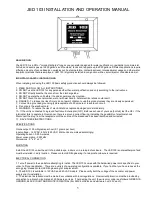
PVI 1800/PVI 2500
Installation and Operation Manual
20
Turning on the inverter:
•
Turn on the dedicated 2-circuit 240/208VAC circuit breaker on the home/building electrical panel
•
Turn on the AC disconnect
•
Turn on the DC disconnect
•
Watch the LED indicators for initialization (all three LEDs on)
•
Watch for blinking green LED and high frequency switching sound (this means that the inverter is
on-line and beginning to feed power into the AC circuit), the inverter is operating normally
•
Last, look for a steady green LED indicating the inverter has stabilized at Maximum Power Point
Operation:
The control electronics will be active as soon as DC (PV) voltage reaches 125V DC. The inverter will go
on-line with the utility/building grid when the DC voltage first exceeds 150V DC. Next, the inverter will
load the array, bringing the DC voltage down from 150V DC to no less than 125V DC.
Once there is enough PV power at 125V DC to back feed AC power switching will automatically feed
power to the grid.
Because the inverter goes completely off line at night or in dark conditions when no power can be
produced, the standby losses are less than 0.25 Watt, adding 1-2% additional energy production annually
compared to some competitor’s inverter designs that remain on all the time.
Operating states, GFDI status and error indications shown by the LED indicators, an extensive data is
shown by the LCD display which are described in chapter 4, “Power, GFDI, Error LED Indicators and
LCD Display”.
4
Power, Ground Fault, Error LED Indicators and LCD Display
The inverter operates automatically without the need for user interaction or maintenance.
The PVI 1800/PVI 2500 automatically starts feeding AC power into the grid every morning as the sun
rises, as soon as sufficient DC voltage and PV power is available. The inverter microcontroller runs
through various checks before going online with the grid and feeding power into the grid.
















































